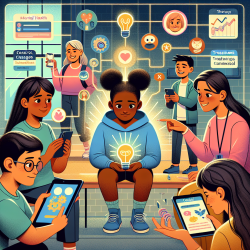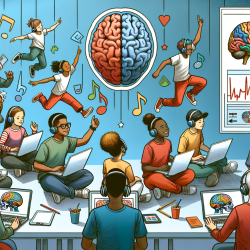Introduction
As practitioners dedicated to improving children's mental health outcomes, we must remain informed about innovative approaches that leverage technology to address mental health challenges. A recent study titled "Reducing depressive symptomatology with a smartphone app: study protocol for a randomized, placebo-controlled trial" offers valuable insights into the potential of mobile applications in treating depression. This blog explores how the findings from this study can inform and enhance the delivery of online therapy services, particularly in educational settings.
The Study: A Closer Look
The study conducted a randomized, placebo-controlled trial to evaluate the effectiveness of a newly developed smartphone app grounded in Cognitive Behavioral Therapy (CBT) principles. The app was designed to decrease moderate depressive symptoms and improve emotional well-being. Participants were randomly assigned to three groups: an active intervention group using the app, a placebo group using a sham version, and a delayed intervention group.
Over six weeks, participants in the active and placebo groups engaged with the app, receiving weekly therapist check-ins via phone. The primary outcome measured was the level of depressive symptomatology, with secondary outcomes including emotional well-being and satisfaction with life.
Key Findings and Implications
The study's findings suggest that the app significantly reduced depressive symptoms compared to the placebo. This highlights the potential of mobile technology as a viable tool for mental health interventions. For practitioners in schools, this presents an opportunity to integrate similar technology-driven solutions into therapy services, offering students a flexible and accessible means of support.
Here are some key takeaways for practitioners:
- Increased Accessibility: Mobile apps can overcome barriers such as stigma and logistical costs, making mental health support more accessible to students.
- Personalized Interventions: Apps offer personalized experiences, allowing students to engage with content at their own pace, enhancing treatment adherence.
- Data-Driven Insights: The app's ability to track progress and mood provides valuable data for practitioners to tailor interventions effectively.
Encouraging Further Research
While the study provides promising results, it also underscores the need for further research to explore the long-term effects and potential side effects of such interventions. Practitioners are encouraged to engage in ongoing research and collaboration to refine and expand the use of technology in mental health care.
Conclusion
Incorporating technology into mental health interventions holds immense promise for enhancing therapy outcomes in educational settings. By staying informed about research developments and actively integrating evidence-based solutions, practitioners can play a pivotal role in shaping a brighter future for children's mental health.
To read the original research paper, please follow this link: Reducing depressive symptomatology with a smartphone app: study protocol for a randomized, placebo-controlled trial.










